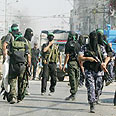
An education and health dispute that has sparked a huge strike in Gaza may deepen the rift between Hamas and Fatah and harm chances of Palestinian reunification, a United Nations envoy said on Tuesday.
Middle East envoy Robert Serry made the remarks as a pro-Fatah employees union in Gaza announced plans to extend the strike, involving thousands of educators and health care workers, for another week.
Some 85 percent of education workers and about 70 percent of primary care personnel have walked off their jobs in Gaza since Saturday, paralyzing services, a UN source said. They accuse Hamas rulers of transferring Fatah supporters from their posts.
In a statement, Serry expressed "concern at the reports of transfers and replacements of health and teaching professionals in the Gaza Strip."
"These actions and the subsequent strike called by unions threaten the provision of health and education services to the people of Gaza who already face considerable hardship," he said, alluding to an Israeli blockade that already limits supplies.
'Hamas of exercising suppression'
Israel has restricted border crossings into Gaza since Hamas Islamists seized the territory violently from President Mahmoud Abbas's Fatah movement a year ago and stepped up rocket attacks against Israel. These have been curtailed by a mid-June truce.
Serry said the situation created by the strikes "only further entrenches the division between Gaza and the West Bank and prejudices the prospects for Palestinian reunification."
Bassem Zakarna, head of the pro-Fatah union, said the Gaza sanctions, initially planned for four days, would continue for another week to press Hamas to reverse its policy and end its seizure of a teachers' union headquarters in Gaza City.
The teachers went on strike on Aug. 24, and were joined by the health workers on Saturday. Zakarna also accused Hamas of exercising "suppression" by arresting some striking workers.
Hamas has condemned the strike and denies any services have been paralyzed. It rejects accusations that its officials haved moved personnel for political motives, saying any job transfers have been done for "technical and administrative" reasons.















